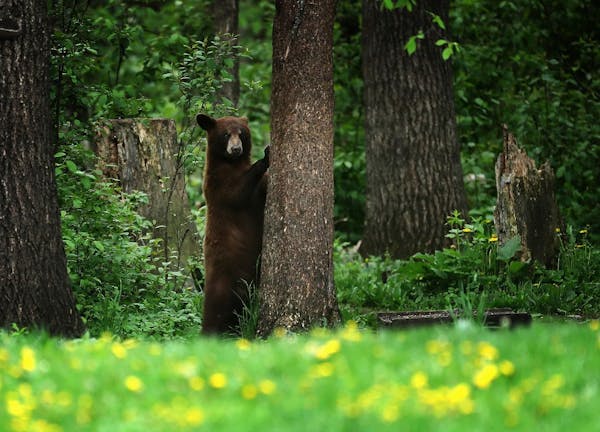A woman staying at a family cabin on a Rainy Lake island was killed by a black bear in what experts said was an extremely rare attack.
The remote family cabin on Red Pine Island is in Canadian waters, about a quarter-mile north of the international border that divides Rainy Lake and about 10 miles northeast of International Falls, Minn.
The 62-year-old woman, whose name has not yet been released by authorities, was at the cabin on the heavily wooded island with her parents, who are from Minnesota, Ontario Provincial Police Constable Jim Davis said Tuesday. The woman had gone outside about 6 p.m. Sunday when she heard her two dogs barking. The dogs, one of them injured, eventually returned to the cabin but the woman didn't. That's when her parents, who are in their 80s, called police, Davis said.
Provincial officers from Fort Frances arrived by boat about 30 minutes later and began searching the area for the woman.
"It took them awhile because there's a lot of underbrush and different trails," Davis said. Eventually they found a yearling bear standing over her body. Officers shot the bear while another yearling and a sow were nearby in the brush, acting aggressively, making noises with their mouths and stomping, Davis said.
It will be up to Ontario's Ministry of Natural Resources and Forestry to decide what to do with the other two bears, he said.
In a written statement, a spokesperson with the ministry said officials there "are determining next steps."
"Attacks of this nature are extremely rare and our hearts go out to the family and friends of the victim," the statement said.
Fatal attacks even rarer
Minnesota bear experts agree that black bear attacks are rare and fatal attacks even more so.
In late July, a 16-year-old girl was jogging on a path near White Iron Lake, east of Ely, when a black bear ran after her, biting her on the thigh before taking off. The encounter occurred in an area where bears have gone dumpster diving for food and near an area where people have fed them, said Andy Tri, a wildlife research biologist who has worked on the Minnesota Department of Natural Resources' bear research project since 2010.
Conservation officers investigating the incident found a bear with markings similar to what the teenager described at a dumpster and shot it. Officials are waiting for DNA results to confirm whether the bear they shot is the one that bit the girl, Tri said.
"There hasn't been bear activity at the dumpster since," he said.
Another attack occurred in December 2017 along the shores of McDougal Lake near Isabella, Minn. In that case, a bear bit a man's pet corgi.
"The guy basically went around and gave it a bear hug and pulls [the dog] off," Tri said. The bear then spun around and bit the man in the stomach, leaving him with bruises and a puncture wound.
The bear quickly wandered off and encountered two carpenters working on a nearby cabin. The men fended off the bear with a sawhorse and a shovel but not before one of them was bitten, Tri said. A conservation officer found the bruin nearby and killed it. An examination showed the bear had brain swelling, which might explain its unusual behavior, Tri said.
Fatal bear attacks in Minnesota are so rare that Tri can't remember when one occurred. "Probably zero or one since statehood," he guessed.
A predatory attack by a bear that stalks a human as a food source is "beyond extremely rare," Tri said. One case occurred in 1987, when two men paddling in the Boundary Waters Canoe Area Wilderness said they survived a black bear attack.
Conservation officers found and shot the 90-pound female bear.
Most bear attacks — maybe one every two years or so — are defensive, he said.
"They have a natural fear of humans, and 99 times out of 100, if you come across a bear in the woods and make noise, they're going to spook off and leave," Tri said.
Even a mother bear who is protective of her cubs won't likely physically attack a human. "She may do a bluff charge … to scare you but she won't get close," he said.
A barking dog, however, could lead to something more physical.
"If they get cornered, they're more apt to have one of these defensive attacks," he said.




